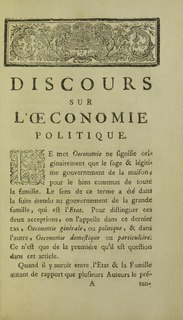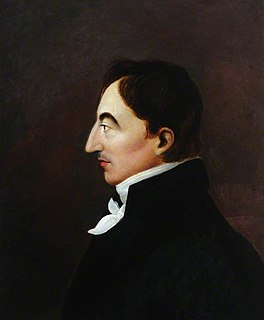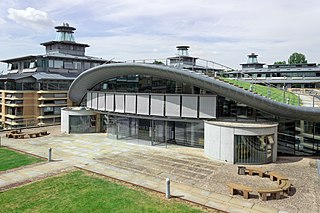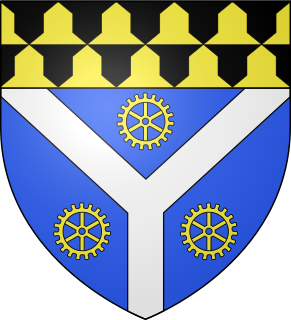Related Research Articles

Political economy is the study of production and trade and their relations with law, custom and government; and with the distribution of national income and wealth. As a discipline, political economy originated in moral philosophy, in the 18th century, to explore the administration of states' wealth, with "political" signifying the Greek word polity and "economy" signifying the Greek word οἰκονομία. The earliest works of political economy are usually attributed to the British scholars Adam Smith, Thomas Malthus, and David Ricardo, although they were preceded by the work of the French physiocrats, such as François Quesnay (1694–1774) and Anne-Robert-Jacques Turgot (1727–1781). There is also a tradition which is almost as long, of critique of political economy.
The Lucasian Chair of Mathematics is a mathematics professorship in the University of Cambridge, England; its holder is known as the Lucasian Professor. The post was founded in 1663 by Henry Lucas, who was Cambridge University's Member of Parliament in 1639–1640, and it was officially established by King Charles II on 18 January 1664. It was described by The Daily Telegraph as one of the most prestigious academic posts in the world and its former holders include Isaac Newton, Charles Babbage, George Stokes, Joseph Larmor, Paul Dirac and Stephen Hawking.

Peter Paul Dobrée was a British classical scholar and critic.
The Sadleirian Professorship of Pure Mathematics, originally spelled in the statutes and for the first two professors as Sadlerian, is a professorship in pure mathematics within the DPMMS at the University of Cambridge. It was founded on a bequest from Lady Mary Sadleir for lectureships "for the full and clear explication and teaching that part of mathematical knowledge commonly called algebra". She died in 1706 and lectures began in 1710 but eventually these failed to attract undergraduates. In 1860 the foundation was used to establish the professorship. On 10 June 1863 Arthur Cayley was elected with the statutory duty "to explain and teach the principles of pure mathematics, and to apply himself to the advancement of that science." The stipend attached to the professorship was modest although it improved in the course of subsequent legislation.
The Regius Professorships of Divinity are amongst the oldest professorships at the University of Oxford and the University of Cambridge. A third chair existed for a period at Trinity College, Dublin.
The Quick Professorship of Biology is one of the senior professorships in biology at the University of Cambridge.

Ayesha Jalal is a Pakistani-American historian who serves as the Mary Richardson Professor of History at Tufts University, and was the recipient of the 1998 MacArthur Foundation Fellowship.
Avner Greif is an economics professor at Stanford University, Stanford, California. He holds a chaired professorship as Bowman Family Professor in the Humanities and Sciences.
Tenure is a category of academic appointment existing in some countries. A tenured post is an indefinite academic appointment that can be terminated only for cause or under extraordinary circumstances, such as financial exigency or program discontinuation. Tenure is a means of defending the principle of academic freedom, which holds that it is beneficial for society in the long run if scholars are free to hold and examine a variety of views.

The Faculty of Mathematics at the University of Cambridge comprises the Department of Pure Mathematics and Mathematical Statistics (DPMMS) and the Department of Applied Mathematics and Theoretical Physics (DAMTP). It is housed in the Centre for Mathematical Sciences site in West Cambridge, alongside the Isaac Newton Institute. Many distinguished mathematicians have been members of the faculty.
The University of Cambridge was the birthplace of the 'Analytical' School of Philosophy in the early 20th century. The department is located in the Raised Faculty Building on the Sidgwick Site and is part of the Cambridge School of Arts and Humanities. The Faculty achieved the best possible results from The Times 2004 and the QAA Subject Review 2001 (24/24). In the UK as of 2020, it is ranked second by the Guardian, second by the Philosophical Gourmet Report, and fifth by the QS World University Rankings.

The Yale School of Engineering & Applied Science is the engineering school of Yale University. When the first professor of civil engineering was hired in 1852, a Yale School of Engineering was established within the Yale Scientific School, and in 1932 the engineering faculty organized as a separate, constituent school of the university. The school currently offers undergraduate and graduate classes and degrees in electrical engineering, chemical engineering, computer science, applied physics, environmental engineering, biomedical engineering, and mechanical engineering and materials science.
The Political Economy Club is the world's oldest economics association founded by James Mill and a circle of friends in 1821 in London, for the purpose of coming to an agreement on the fundamental principles of political economy. David Ricardo, James Mill, Thomas Malthus, and Robert Torrens were among the original luminaries.
George Pryme was a British economist, academic and politician.
Sir Molyneux Hyde Nepean was an English first-class cricketer who played a single match for the Marylebone Cricket Club.

The Faculty of History is one of the constituent departments of the University of Cambridge.
The Rumford Chair of Physics is an endowed professorship established at Harvard University in 1816 under the will of Benjamin Thompson, Count Rumford.
The Professorships of Engineering are several established and personal professorships at the University of Cambridge.
References
- 1 2 "Professors". Cambridge University. Retrieved 5 April 2019.